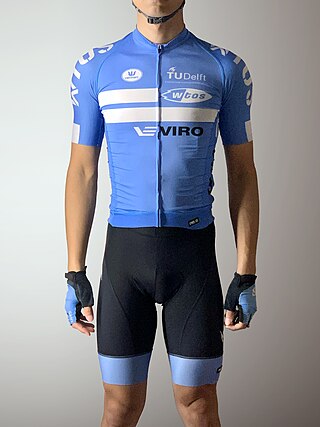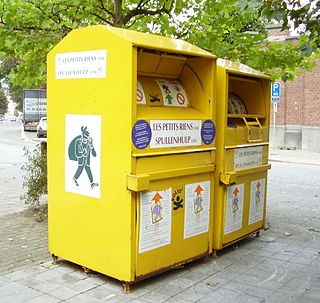
Spandex, Lycra, or elastane is a synthetic fiber known for its exceptional elasticity. It is a polyether-polyurea copolymer that was invented in 1958 by chemist Joseph Shivers at DuPont.

Polyethylene terephthalate (or poly(ethylene terephthalate), PET, PETE, or the obsolete PETP or PET-P), is the most common thermoplastic polymer resin of the polyester family and is used in fibres for clothing, containers for liquids and foods, and thermoforming for manufacturing, and in combination with glass fibre for engineering resins.
Eastman Chemical Company is an American company primarily involved in the chemical industry. Once a subsidiary of Kodak, today it is an independent global specialty materials company that produces a broad range of advanced materials, chemicals and fibers for everyday purposes. Founded in 1920 and based in Kingsport, Tennessee, the company now has more than 50 manufacturing sites worldwide and employs approximately 14,000 people.

The textile industry is primarily concerned with the design, production and distribution of textiles: yarn, cloth and clothing. The raw material may be natural, or synthetic using products of the chemical industry.

Polyester is a category of polymers that contain the ester functional group in every repeat unit of their main chain. As a specific material, it most commonly refers to a type called polyethylene terephthalate (PET). Polyesters include naturally occurring chemicals, such as in plants and insects, as well as synthetics such as polybutyrate. Natural polyesters and a few synthetic ones are biodegradable, but most synthetic polyesters are not. Synthetic polyesters are used extensively in clothing.
The Industrial Technology Research Institute is a technology research and development institution in Taiwan.

Fast fashion is the business model of replicating recent catwalk trends and high-fashion designs, mass-producing them at a low cost, and bringing them to retail stores quickly while demand is at its highest. The term fast fashion is also used generically to describe the products of the fast fashion business model.
Heinz Joseph Gerber was an American inventor and businessman. An Austrian-born Jewish Holocaust survivor who immigrated in 1940, he pioneered computer-automated manufacturing systems for an array of industries. Described as the "Thomas Edison of manufacturing", he was one of the first to recognize and develop the productivity-enhancing potential for computer automation in skill-intensive industrial sectors.

Textile recycling is the process of recovering fiber, yarn, or fabric and reprocessing the material into new, useful products. Textile waste is split into pre-consumer and post-consumer waste and is sorted into five different categories derived from a pyramid model. Textiles can be either reused or mechanically/chemically recycled.

Sustainable fashion is a term describing products, processes, activities, and people that aim to achieve a carbon-neutral fashion industry built on equality, social justice, animal welfare, and ecological integrity. Sustainable fashion concerns more than fashion textiles or products, rather addressing the entire process in which clothing is produced, consumed and disposed of. The movement looks to combat the large carbon footprint that the fast fashion industry has created by reducing the environmental impact such as air pollution, water pollution and climate change.

MAS Holdings is a design-to-delivery solution provider in apparel and textile manufacturing, headquartered in Sri Lanka. Founded in 1987 by Mahesh, Sharad and Ajay Amalean, the company began as an intimate apparel manufacturer and later diversified into sportswear, performance wear, swimwear, brands, wearable technology, FemTech, start-ups and industrial parks. The organization employs 110,000 people across 57 manufacturing plants in 17 countries, with design locations in Colombo, New York, London, and Hong Kong.
Massimo Osti (1944–2005) was an Italian garment engineer and fashion designer, most famous as the founder of the apparel brands Stone Island and C.P. Company. Osti's products were a mix of his own innovations and design ideas he got from studying military clothing, work-wear, and sportswear.
Zero-waste fashion refers to items of clothing that generate little or no textile waste in their production. It can be considered to be a part of the broader sustainable fashion movement. Zero-waste fashion can be divided into two general approaches: pre-consumer zero-waste fashion, which eliminates waste during manufacture, and post-consumer zero-waste fashion, which generates clothing from garments such as second-hand clothing. Historically, zero-waste models have been utilised in folk clothing, including the kimono, sari, and chiton, among others.

Kornit Digital is an Israeli-American international manufacturing company. It produces high-speed industrial inkjet printers, and pigmented ink and chemical products for the garment and apparel, home goods, and textile accessories decorating industry. Kornit Digital has offices in Israel, Hong Kong, China, Germany and the USA. Ofer Ben Zur was Kornit CEO from its founding in 2002 until 2014, when he was succeeded by Gabi Seligsohn; Ben Zur remained as Chief Technology Officer. Ronen Samuel, formerly of HP Indigo, succeeded Seligsohn as CEO in June of 2018.

Cotton recycling is the process of converting cotton fabric into fibers that can be reused into other textile products.

Founded in 2005, the Global Electronics Council (GEC), formerly known as the Green Electronics Council, is a US-based environmental non-profit with a stated mission to "create a world where only sustainable technology is bought and sold".
Clothing industry or garment industry summarizes the types of trade and industry along the production and value chain of clothing and garments, starting with the textile industry, embellishment using embroidery, via the fashion industry to apparel retailers up to trade with second-hand clothes and textile recycling. The producing sectors build upon a wealth of clothing technology some of which, like the loom, the cotton gin, and the sewing machine heralded industrialization not only of the previous textile manufacturing practices. Clothing industries are also known as allied industries, fashion industries, garment industries, or soft goods industries.

The fashion industry, particularly manufacture and use of apparel and footwear, is a significant driver of greenhouse gas emissions and plastic pollution. The rapid growth of fast fashion has led to around 80 billion items of clothing being consumed annually, with a large number going to landfill.
The Taiwan Textile Research Institute is a government funded research institute in Taiwan (ROC) which supports the textile industry.
Recover Textile Systems, mainly known as Recover™, is a materials science company and producer of mechanically recycled cotton fiber and recycled cotton fiber blends, created in 2020 with its headquarters in Banyeres de Mariola, Spain.













